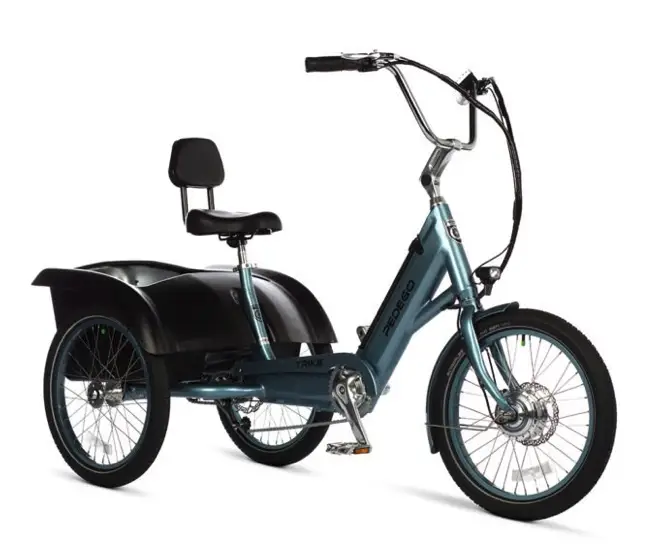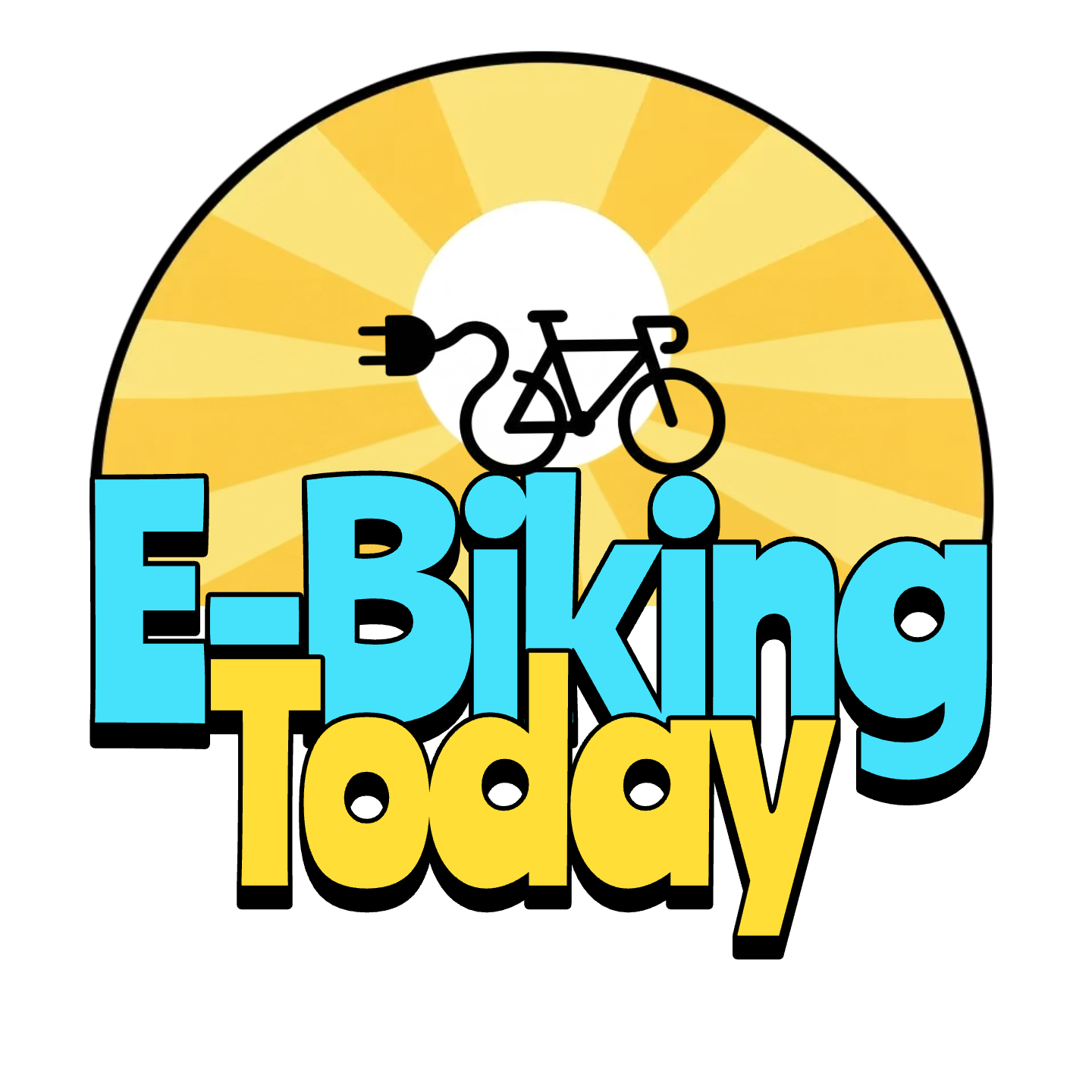If you’ve never learned how to ride a bike, then you’re definitely missing out, especially now that electric bikes are everywhere! Electric bikes make riding even more enjoyable than a regular bike. But, don’t worry, I can help you get in on the fun!
There are three ways you can ride an electric bike even if you have never ridden a regular bicycle before:
- Learn how to ride a regular bicycle before getting on an electric bike
- Start learning how to ride an electric bike without using the motor (or pedal assist)
- Ride an electric tricycle that has three wheels so you don’t have to worry about balancing
Riding even a regular bike has a learning curve and takes practice. If you’ve never ridden a bike, or haven’t ridden in a long time when you decide to get on an electric bike, it can be a bit of a challenge.
Although I knew how to ride a bike when I got my electric bike, I hadn’t ridden much for most of my adult years. So, while it took a few weeks to get comfortable balancing on my e-bike, it was several months until I got entirely comfortable braking, using gears, and making turns.
But it was 100% worth taking the time to learn how! My husband and I wouldn’t trade our e-bikes for any other type of outdoor activity!
Even if you’ve never been on a traditional bike before, you’ll have so much fun on an electric bike that you’ll kick yourself for not learning how to ride a bike sooner!
So, if you’re considering riding electric bikes, but you’ve never been on a regular bike, I can help you discover what you need to know (yes, even if you’re an adult who’s never ridden a bike)!
Follow along so that you’ll be prepared to choose the best way to learn how to ride an e-bike.

How to Ride a Bike (regular or electric?)
The instructions I’m going to give you to learn how to ride a bike for the first time can be followed for both normal bikes and electric bikes.
However, I strongly suggest that you learn how to ride a regular bicycle before getting on an electric bike. This is the safest and easiest method of preparing yourself to ride e-bikes.
How to Prepare for Your First Bike Riding Lesson
- Make sure your bike or e-bike fits you well
The first thing you should do in getting ready to learn how to ride a bike is to practice on one that fits you well. If you’re not getting fitted at a bike shop, then here’s what you should do:
Test the seat height–
When you’re sitting on the seat, your feet should barely reach the ground (with just the top pads of your feet touching). Also, when your foot is on the lowest point of the pedal rotation, your knee should only have a slight bend to it (so you don’t end up hurting your knees).
However, riding an e-bike is a little different because its heavy. Therefore, for e-bikes, I suggest you keep your seat low enough to be able to put your feet almost flat on the ground, just while you learn to ride. Afterwards, you can move your seat up when you feel in control (otherwise, riding may hurt your knees).
Check the reach–
You don’t want to extend your arms and torso further than 45 degrees to the handlebars. In fact, it’s best if you can sit as upright as possible when learning to ride a bike for the first time. - Wear appropriate clothing
You don’t need to wear anything fancy or get a cycling wardrobe yet. Rather, you just want to make sure your pant legs aren’t in the way of pedaling and your sleeves don’t interfere with gripping the handlebars. - Pick a safe, flat location for your first outing
Choose a relatively flat location with just a very gentle slope. This way, you’ll be able to get on the bike and have it start rolling slowly without figuring out how to pedal immediately.
Riding electric bikes for the first time may require less of a slope since its weight will help it roll foward on its own. - Get a bike buddy
Choose a friend or family member who is confident in they’re ability to hold the back of the bike seat… and who will cheer you on!
One who knows how to ride e-bikes would be a bonus!
3 Easy Steps to Learn How to Ride Your Bike or E-Bike
Now you’re ready to learn to ride a bike! Follow these steps and repeat each until you feel comfortable moving on to the next one.
- Step One: Getting seated and “walking the bike”
Get on the bike and put your weight in the back of the saddle. Then while still on the bike, walk along with it to test your center of gravity. Practice using your hands to gently pull on the brakes so you can get a feel for stopping the bike from moving forward.
Once again, if you’re learning to ride on an e-bike (because e-bikes are generally heavier) be prepared to put a good deal of pressure on the hand brakes, because it won’t stop quite as fast.
Sit up and keep your eyes ahead of you, not down at the bike or your feet. Have a goal in mind… to reach a certain object, such as a light pole for the end of the block. This is where you can focus your eyes while you begin. - Step Two: Balance with help from your buddy
Now it’s time for your bike buddy to help. Ask them to lightly grab the back of the bike’s seat as you move forward. This will increase your feeling of security but they shouldn’t try to balance the bike for you.
Start walking your bike again with your feet but this time picking up each foot as you go. Continue on in this fashion until you feel comfortable picking up both feet slightly off the ground and rolling forward. Now you’ll really feel balance come into play.
And, on an e-bike, the weight distribution can be a little harder to manage because of the bigger frame and extra weight, so give it some time.
Your bike buddy can be asked to stop holding onto the back of the seat as soon as you’re ready (but don’t let them leave).
Practice scooting forward on your bike by yourself over and over until you’re comfortable with moving on to the last step. - Step Three: Begin pedaling
When you’re ready, put one foot on a pedal.
You can do this by rotating the pedal for the foot you want to start with to the top (around the 2 o’clock position).
Keep one foot on the ground until the bike is moving. Push down the foot on the pedal while looking ahead. Once your foot on the pedal has been pushed down and the bike is moving, put your other foot on the other pedal.
Need that bike buddy again? Ask them to hold gently onto the back of the seat once again as you continue moving forward. But don’t let them take over your balancing… just have them move along with you.
Keep in mind that it’s harder to balance when the bike is moving slowly. So when you’re ready, ask your friend to give the bike a little push. Keep your hands on the brakes so you can use them anytime you need to and put your foot down when you tip to one side.
It might take a little bit longer to feel confident pedaling an e-bike, even without the motor, but you’ll get it!
That’s it! Keep practicing until you can start and stop effortlessly! Then, if you haven’t been learning how to ride an e-bike, now you’re officially ready to learn how.
It’ll be helpful to watch this video before riding a bike for the first time:
How to Ride an Electric Bike for the First Time (Safety Considerations)
Riding an electric bike for the first time could be dangerous if you’re a beginner unless you take a cautious approach. This is especially true if you’re never ridden a bike at all before.
If you’re super adventurous and decide you’d rather just get on an electric bike, rather than learning to ride on a regular bike first, then here’s the good news…
You can basically follow the three steps above but with some major caveats to learning on e-bikes.
Is it Safe to Use the Electric Motor?
Generally, I’d advise against using the e-bike’s motor when learning how to ride a bike the first time. Even a low-wattage bike (250W) is powerful enough to move you forward quickly, whether or not you’re prepared.
Having ridden a bike previously, I quickly discovered this power when I almost ran into my daughter’s car… and there have been numerous times I had a hard time stopping quickly enough (yep, hopped over a curb once too).
Safety should be a major consideration when riding any bike for the first time. However, electric bikes add a couple of levels of concern, and even danger, if you’ve never learned how to ride a standard bicycle.
How Does Riding a Heavy Electric Bike Affect Balance? (and other safety concerns)
Electric bikes tend to be 20-50 pounds heavier than traditional bicycles. So when you’re learning to ride on an e-bike, maintaining good balance will be harder.
Further, starting to move forward is also much harder on electric bikes because of the heavier weight (as compared to a regular bike). You’ll definitely want to have a slight decline when you’re ready to scoot along on your own, as well as when you are ready to start pedaling on your own.
Of course, you can opt to use the motor on its lowest level. But this will be dangerous if you don’t have a good grasp of your balance and how to start and stop first. If you decide to learn to ride on an e-bike, just make sure there is no one else around (and no cars, poles, or other hazards in your way).
Oh yes, and your bike buddy may have a harder time holding the e-bike upright but not balancing it for you.
What Types of E-Bikes Are Best for Beginners?
As a total beginner to biking, it can be confusing to decide which kind of electric bike is best for you. Electric road bikes, commuter e-bikes, and hybrids are all potential options. However, I’d avoid an electric mountain bike for now!
Here are some articles to review that’ll help you choose the best e-bike for you:
- Types of E-bikes: And How Much They Cost
- How to Choose a Good Electric Bike for Beginners
- Tips for Buying an Electric Bike (and are cheap ones any good)
How to Ride an Electric Trike (Start today)
The easiest, and fastest, way to ride an electric bike is to get on an e-trike! This is essentially a tricycle (like a child’s) but it’s much larger and has an electric motor.
An electric tricycle has three wheels which remove the need to balance as well as most of the fear and anxiety that come with learning to ride any kind of bicycle.
Although you won’t need to worry about keeping your balance in the same way you would with a two-wheel bike, which is one reason e-trikes are perfect for overweight and obese riders.
However, you’ll still need a good understanding of how the brakes, motor, pedal assist, and gears work in order to stay safe.

Words of Caution When Learning to Ride an E-Trike:
An electric trike can still be hard to stop when you’re first learning to ride. Again this is due to the extra weight… you’re now talking about three heavy wheels instead of just two. And a very thick frame to match the size and weight of the motor and e-bike battery.
So, practice starting and stopping on the lowest gear level (typically pedal assist level one) when no one (and no safety hazards) are in your way.
E-trikes also take up more space on the road, path, or sidewalk, so make sure you have plenty of room to learn to ride it.
Finally, electric trikes turn much wider than any other kind of e-bikes. So though you don’t have to worry about balancing while riding in general, you do need to be careful to avoid tipping it over.
If you decide to ride an electric trike, I recommend reading this article all about e-trikes:
Conclusion
If you can’t ride a regular bike yet, then riding an electric bike for the first time probably isn’t a good idea. There are safety concerns such as the weight of an electric bike and the ability to balance, start, and stop it, especially when using motor assistance.
As I’ve suggested and discussed above, it’s best to learn how to ride a normal bike before getting on an electric bike. It really won’t take too long to learn and you’ll be e-bike ready in no time! And when you do ride an e-bike for the first time, make sure to do so on its lowest setting.
Or just forget about learning to balance on an e-bike at all. Instead, consider riding an electric trike (but make sure to read my words of caution first).

